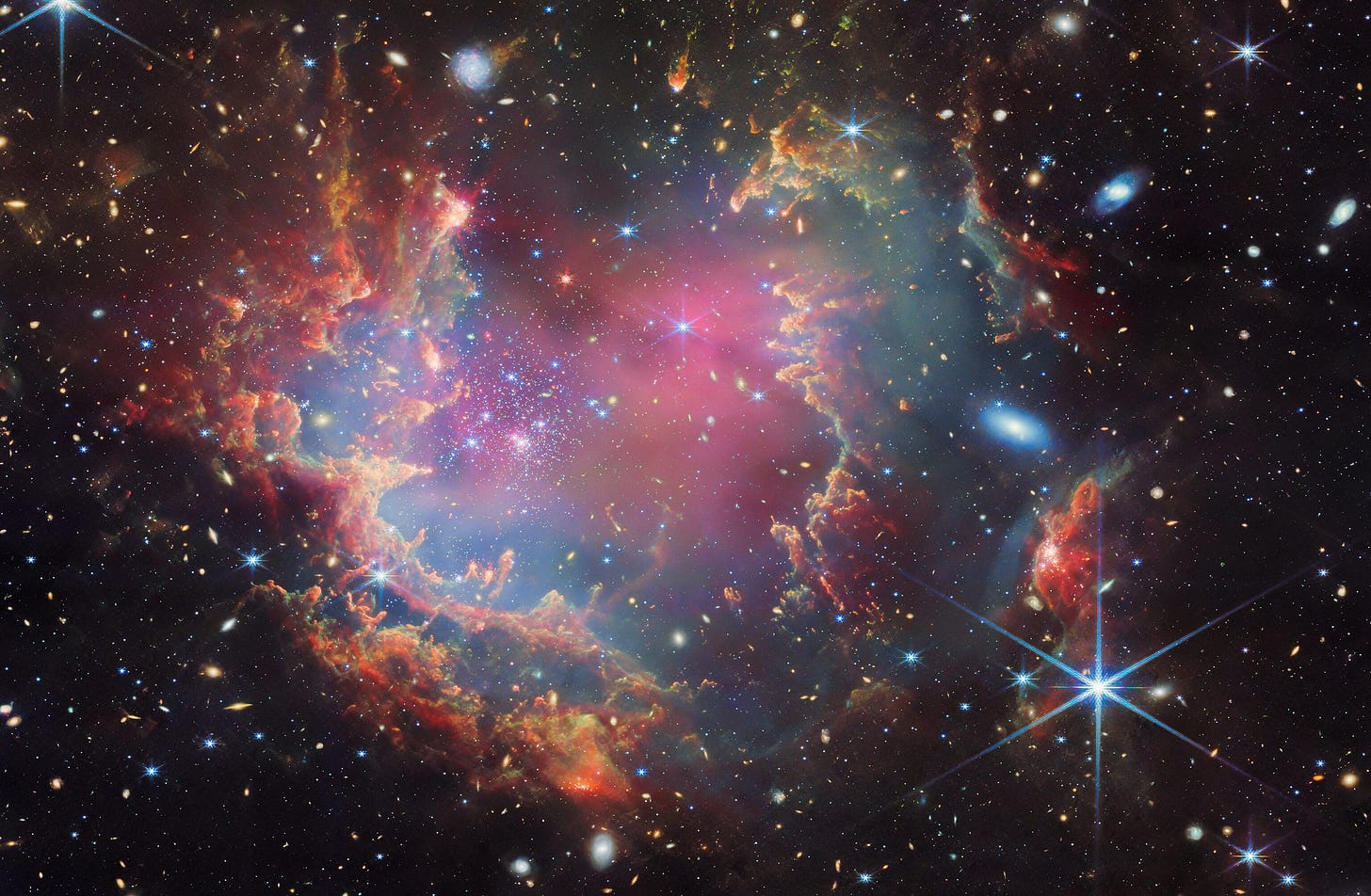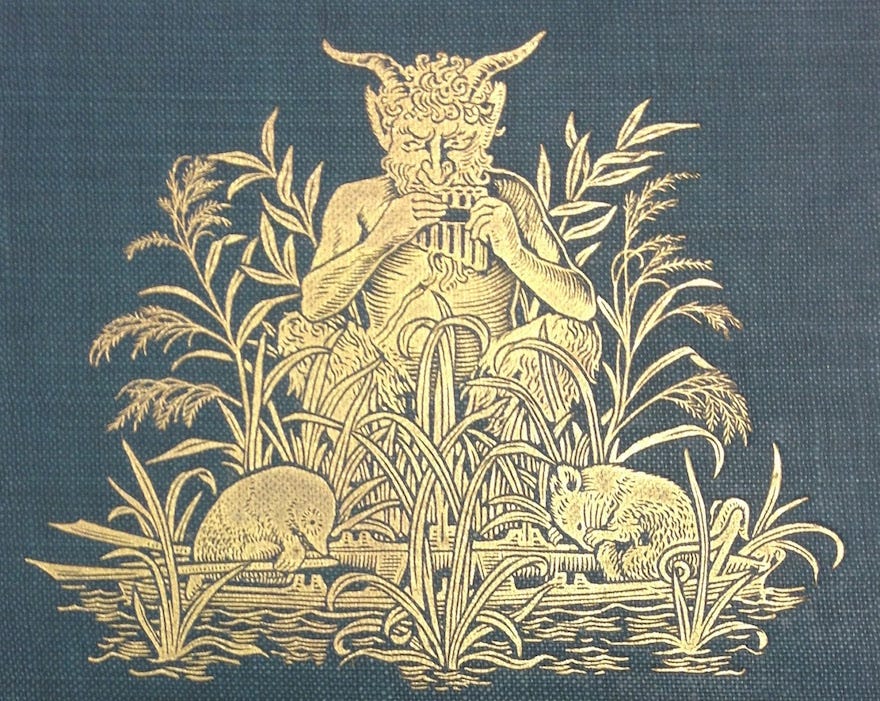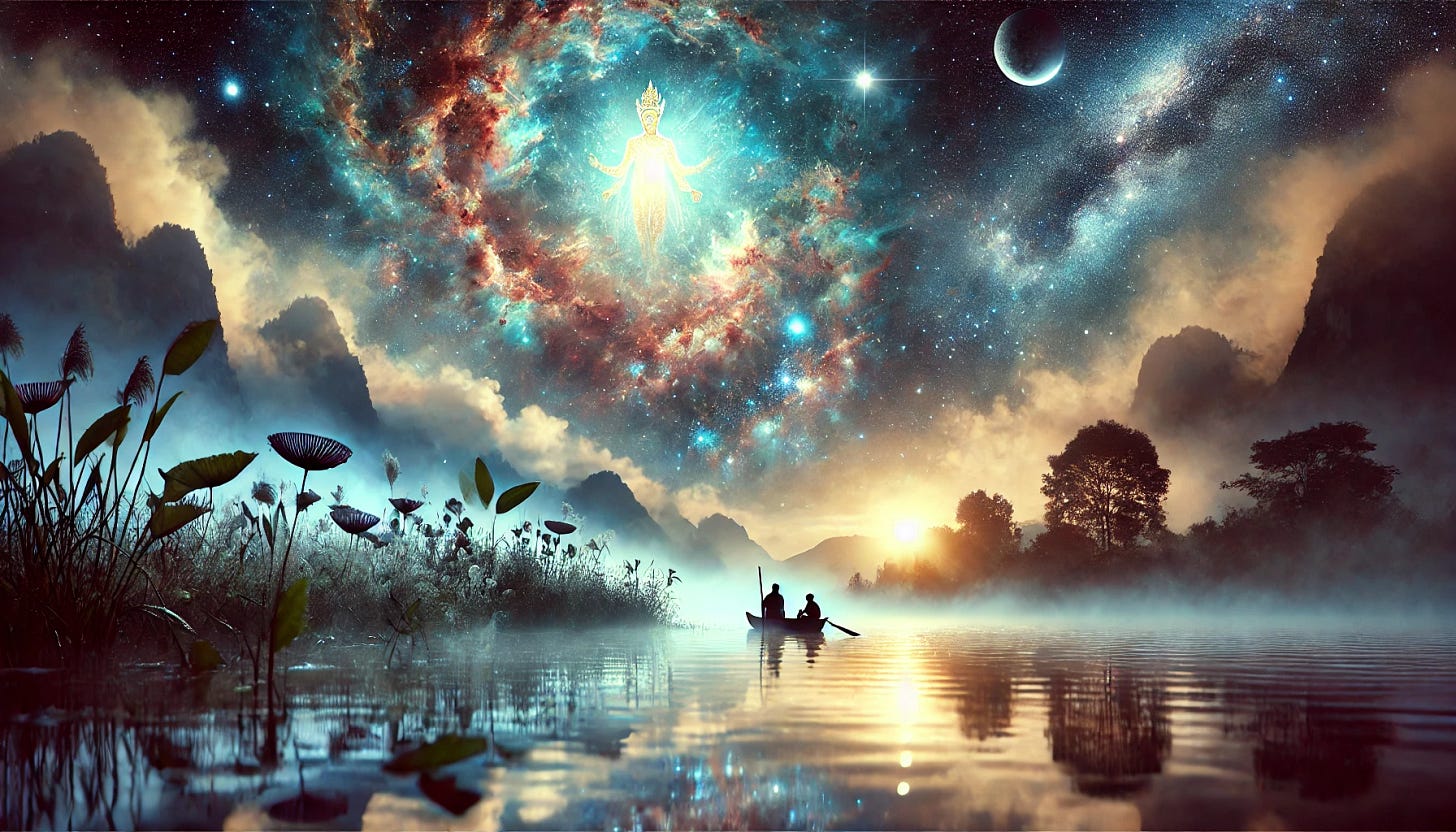Windows Into Cosmic Understanding & the Piper at the Gates of Dawn
Fleeting moments of awe offer us profound glimpses into our place in the universe.
“Breathless and transfixed the Mole stopped rowing as the liquid run of that glad piping broke on him like a wave, caught him up, and possessed him utterly. He saw the tears on his comrade's cheeks, and bowed his head and understood. For a space they hung there, brushed by the purple loose-strife that fringed the bank; then the clear imperious summons that marched hand-in-hand with the intoxicating melody imposed its will on Mole, and mechanically he bent to his oars again. And the light grew steadily stronger, but no birds sang as they were wont to do at the approach of dawn; and but for the heavenly music all was marvellously still.”
-Kenneth Grahame, The Wind in the Willows
“Lime and limpid green, a second scene
Now fights between the blue you once knew
Floating down, the sound resounds
Around the icy waters underground”
-Pink Floyd, Astronomy Dominé, from their album Piper at the Gates of Dawn
Cosmic Significance
Sometimes we come to these moments where it feels like time slows down and we are given brief but wildly self-enlarging realizations about our place in cosmic existence.
I was talking with my friend, Haritina “Hari” Mogoșanu, last night about an experience we’re planning for sharing astrobiology with educators in New Zealand next year and she brought up my recent TEDx talk and the concept of The Panzoic Effect. She relayed that she’s also working on a conceptual idea for an upcoming book chapter (for an anthology of astrobiology education, for which myself and Jessica Xhumari are also working on a chapter). Hari’s idea is regarding the way that some people feel like they’ve become more insignificant in the face of certain experiences, like seeing worlds through a telescope for the first time or understanding some greater vastness to the cosmos than they knew before.
Hari’s idea reminds me of how some people feel like such experiences are part of an ego death (perhaps as they had a bit too much of a perceived importance of themselves beforehand) but also how such experiences can make many people feel more significant—even if we are small and extremely short-lived in matters of the universe, we are here and now and part of the cosmos coming to understand itself.
We are given little windows into the nature of being by the sheer nature of our existence.
But sometimes some of us have experiences that open our windows just a little wider—sometimes it feels like we’re experiencing just a little deeper.
Sharing in the joy of seeing a fireball light up the night’s sky, experiencing the transcendent impacts of the path of totality during a solar eclipse, sitting out with friends and watching the stars at night, seeing the midnight Sun from a polar region and knowing how very surreal that seems… There are many experiences we can have that tie us to our astronomical heritages of observing the heavens.
Beyond that, there are many other forms of transcendent experiences that bring wonder and awe into our lives.

From spending time in nature, finding joy in moving our bodies in dance or exercise, climbing mountains or SCUBA diving and seeing a world under the surface of the ocean, coming out of a state of deep reflection from meditation or reading and feeling a sense of greater depth, embracing with others and making love, finding a part of ourselves as we come through the grips of sadness or loss, the joy of sensation from smelling an aroma of delectable food or the wisps of smoke coming from a campfire, and more. There are many ways for us to feel a deeper impact during our experience of being. Sometimes we even find such an awakening moment in something that otherwise would seem mundane and commonplace.
During some of these impactful, sensual, connective, and transcendent experiences, we even feel like a little layer of the cosmic onion has been peeled back, and we see or hear or feel something that is hard to put into words but feels like a momentary cosmic significance.
The Piper at the Gates of Dawn
Chapter 7 of The Wind in the Willows by Kenneth Grahame, titled "The Piper at the Gates of Dawn," is one of the most mystical and moving chapters in the book.
In this chapter, Rat and Mole embark on a nighttime journey to find Portly, the young otter who has gone missing. As they navigate the river in the dark, they are drawn to a haunting, enchanting melody that seems to fill the air—a piper piping magical sounds into the wilderness—calling them onward.
Eventually, Rat and Mole discover the source of this mysterious music: a great being of nature (often considered to be the god-like figure of Pan), the Piper at the Gates of Dawn:
“A wide half-circle of foam, glinting lights, and shining shoulders of green water formed where the great weir spanned the backwater from bank to bank, disturbing the quiet surface with twirling eddies and streaks of foam, while its solemn, soothing rumble drowned out all other sounds. In the middle of the stream, encircled by the shimmering embrace of the weir, lay a small island, closely fringed with willow, silver birch, and alder. The island seemed reserved and shy, yet full of significance, as if it concealed something behind a veil, waiting to reveal its secrets at the destined hour to those who were called and chosen.”
The piper (weir, Pan, nature deity…) embodies the spirit of nature itself, a presence that is both gentle and powerful, evoking a deep sense of awe, peace, and protection.
In this serene moment of the story, Rat and Mole find their friend Portly safe and sleeping at the feet of this deity. The chapter describes Pan as radiating a comforting and supernatural energy, which profoundly moves Rat and Mole, who feel a connection to something larger than themselves.
However, perhaps one of the most intriguing things that Kenneth Grahame brought into this story, was the concept of amnesia being placed upon Rat and Mole by the Piper to help them return to their lives. They were so overcome with the intense and remarkable awe of seeing nature fully that they had to forget partly the full depth of the experience, though they remembered that it was impactful and moving:
“As they stared blankly, a deepening sense of dumb misery settled over them as they slowly realized all they had seen and all they had lost. A capricious little breeze danced up from the surface of the water, tossing the aspens, shaking the dewy roses, and blowing lightly, caressingly, across their faces. With its soft touch came instant oblivion, for this is the final, most generous gift the kind demi-god bestows upon those to whom he has revealed himself in their moment of need: the gift of forgetfulness.”
Chapter 7 and the Piper at the Gates of Dawn in Grahame’s writing explore themes of reverence for nature and the divine mystery within it, showing how the natural world holds both beauty and sacredness.
Pan, as the Piper, represents a guardian figure, one who looks after the wild creatures and restores harmony. His presence suggests a transcendental aspect of the natural world, inviting Rat and Mole—and the reader—into an experience of wonder and humility before nature’s power and grace. This sense of awe is so intense that, after they leave, Rat and Mole are left with only a dim memory of the encounter, as if it were a dream or a vision too profound to fully grasp. The window in the workings of the cosmos was opened for them, but only momentarily.
Opening the Cosmic Window
I’ve loved and have found inspiration from the music of Pink Floyd so much in my life. Their musical albums and offerings span a range of styles in psychedelic pop, rock, progressive, rock opera, and spacey music. From their earlier work focused a lot on instrumental explorations and incorporating new digital instruments of the 60s and 70s to their larger conceptual albums like Dark Side of the Moon and The Wall, they created a range of songs that explore life, rock and roll, and experience. Once, in my youth, I spent the better part of an entire summer day sitting in an old wicker rocking chair reading from a volume of The Viking Book of Poetry of the English-Speaking World and listening to The Division Bell on repeat. Good times.
The very first album from Pink Floyd, back at a time when Syd Barret was still their band leader, was called Piper at the Gates of Dawn, named in honor of the nature deity from Kenneth Grahame’s writing. Among the tracks on the album, are two of my favorite of the early Pink Floyd songs: Interstellar Overdrive and Astronomy Dominé:
It’s not surprising that a band like Pink Floyd would touch on the Piper at the Gates of Dawn in one of their albums. For some people, the music of Floyd has at times offered a window into perceptual transcendence, much like what one can experience in meditation, exploring the wilderness, or during heightened moments of perspective: much like the recent ayahuasca ceremony I was invited to.
I’m still working on writing up the experience of the ayahuasca journey for myself, but one interesting thing with regard to these windows of perspective came up for me the day after the ceremony.
Just before we had started the ceremony, I brought an offering of words for everyone to the altar of a shared vision of seeing our world from the outside, seeing the Blue Marble from the perspective of astronauts, looking back on the Earth from space. It turns out this was impactful for at least one of my fellow participants in the meditation.
The day after our ceremony, one of my fellow experiencers shared with me a vision she had experienced during the evening. She had envisioned seeing herself in the perspective of space looking back at the Earth, but she then felt the fabric of spacetime opening before her and felt like just beyond the rift was a deeper understanding of the cosmos. She experienced a window into some cosmic grandeur and she felt like she had briefly experienced it, but was still aware that she could only briefly see part of it through this window, and then the window closed and her experiences continued on in other directions.
Similarly, another experiencer of the ceremony that evening with us shared the next day that he had experienced a vision of looking through a window onto his own life, as though he were an observer from the outside and the window allowed him to have an “outside perspective” of his own regular life.
This transcendence of self and having a window onto our own lives or onto some greater depth to the cosmos is something that many people who’ve had psychedelic experiences have shared. But this is also something very common for those who’ve explored practices in meditation. Meditation can bring transcendent states and exploration of the no-self. There are times in meditation where you are literally out-of-body and may observe yourself as though looking into your being through a window. Some people also have deep transcendent experiences in meditation that feel as though they are opening awareness onto a larger connection to the universe, even if only momentarily.
Such moments open us to a cosmic vantage point, revealing perspectives that alter how we see ourselves and the universe. But, much as with the Piper at the Gates of Dawn, these experiences are often fleeting, and while we come away with a depth of understanding of ourselves and maybe even more openness to experiences of awe and wonder, many of us have felt insignificance or loss or even sadness when we first have such little glimpses into the cosmically significant. In some ways, it takes a lifetime of these experiences (and often some support of guidance from those with knowledge) to help us make sense of what we’ve seen and to find a beautiful acceptance in that we have come back from the transcendent and awe inspiring.
Concluding Thoughts: The Infinite Dance of Wonder
Windows into cosmic understanding—whether opened by nature, art, meditation, or transformative experiences—reveal the profound and interconnected mystery of existence. They remind us of our place in the universe and the depths that lie just beyond our everyday perceptions (if anything, inviting us to more fully explore our existence and the nature of perception).
Like Rat and Mole’s encounter with the Piper at the Gates of Dawn or Pink Floyd’s celestial compositions, each “window” offers a fleeting invitation to step outside ourselves and glimpse the infinite dance of wonder that surrounds us.
In those moments, we sense that life is not merely about understanding the cosmos but about feeling and connecting to it. We are part of a grand, ongoing story, where each experience adds to the rich tapestry of existence—a cosmic dance that is both ephemeral and eternal, connecting us to the essence of being.




